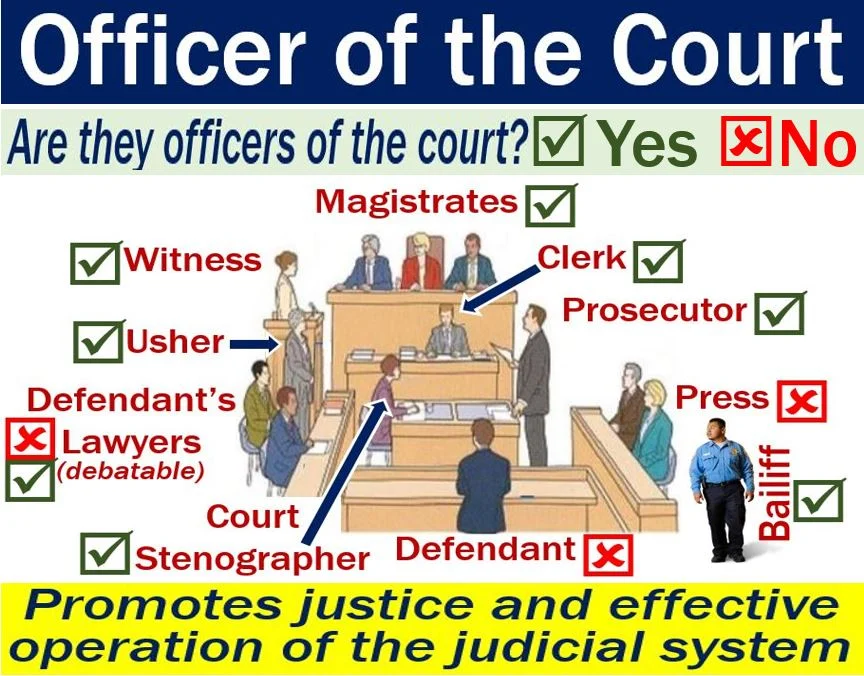When Federal Prison's in Your Future
Are You Going to Federal Prison
In Criminal Cases Knowledge is Key
Sentenced to Federal Prison?
People in the Federal Court Process - A guide

Federal courtroom personnel, all the people in the Federal Court Process, are the vital cogs in the machinery of justice. Authoritative judges preside over cases, making pivotal legal decisions. Clerks and stenographers work tirelessly, managing caseloads and capturing every spoken word..
U.S. Marshals ensure security and order, while attorneys, both prosecutors and defenders, advocate passionately. This diverse team operates in unison, each playing a crucial role in maintaining the integrity, efficiency, and fairness of the judicial process in the courtroom.
Roles & Responsibilities of People in the Federal Court Process
Pre trial Services Officers
These are essentially probation officers and work for the judicial branch of government, specifically the federal court system. They scrutinize defendants post-charge, pre-trial, assessing risk factors and personal backgrounds.
Their reports are pivotal; they recommend bail conditions and monitor compliance, acting as the court’s eyes and ears. Slip up, and they can send you right back behind bars. They conduct Pre Sentence Interviews and the PSR Reports they write can heavily sway a judge’s decision, potentially influencing the severity of your sentence.
When doing pre-sentence interviews, Pretrial Service Officers will often use tactics to put a defendant at ease to get them to give up information that can later be used against them at sentencing. They should NOT be trusted.
U.S. District Court Judges
They are appointed for life, they’re the heavyweights of justice, presiding over white-collar federal crimes. Their gavel is the baton that keeps the court’s rhythm, ensuring fair play in the legal process.
These judges are more than just arbiters of law; they’re the gatekeepers of a defendant’s fate. Every ruling, from evidentiary decisions to sentencing, shapes the case’s trajectory. Their interpretations of law aren’t just words; they’re the very threads that weave the fabric of a trial.
Some Judges are pro-prosecution and frequently former prosecutors themselves, and rubber stamp everything the prosecutor files as the truth, and will disregard any filings done by defense attorneys.
A District Judge’s discretion in sentencing, influenced by factors like the U.S. Sentencing Guidelines and personal judicial philosophy, can mean the difference between a slap on the wrist and a hammer coming down hard.
Federal Prosecutors
They often referred to as Assistant U.S. Attorneys (AUSAs), represent the United States in criminal cases. Their role is to prove beyond a reasonable doubt that a defendant is guilty of the crime charged.
They wield significant power on whether to pursue criminal charges and cut plea and cooperation deals. In the courtroom, AUSAs are the “storytellers” of justice, crafting narratives to sway juries and judges. In the high-stakes world of federal crime, they often set the stage for how justice unfolds.
They’ve been known to engage in prosecutorial misconduct, lie, withhold evidence, and mislead juries and may try to sway defendants with offers of 5K1 sentence reductions for cooperation that many times never pan out. They care little about you or your family and generally regard defendants as scum.
They will frequently offer representations of helping a defendant get a lower sentence but will never put anything in writing, and have been known to state your cooperation had no or little value after they have sucked your brain dry. The Sentencing memorandums they file hold sway with the judge and can seriously affect the defendant’s sentencing.
Court stenographers
These are the courtroom’s discreet archivists, capturing every uttered word with remarkable speed and precision. Seated unobtrusively, their fingers fly across steno machines, translating spoken words into written transcripts in real time. These transcripts are more than just records; they are pivotal in appeals and crucial for legal accuracy.
Their role extends beyond transcription. As modern-day information managers, stenographers provide instant access to testimony, making them indispensable in trial proceedings. Imagine a lawyer needing to challenge a statement made hours earlier; the stenographer retrieves it in moments, ensuring seamless flow and factual accuracy in legal arguments.
Federal court clerks
They are the grease in the judicial machine, keeping things running smoothly in a world where a misplaced document can spell disaster. Court clerks are the logistical wizards, managing the flow of legal documents with the precision of a maestro.
They handle everything from filing cases to managing the court’s schedule. Think of them as air traffic controllers for legal paperwork, directing the flow of motions, briefs, and rulings to ensure nothing collides.
But their role isn’t just administrative. They’re the gatekeepers of legal knowledge, often the first point of contact for lawyers and the public. Need to know the status of a motion or how to navigate the labyrinthine court procedures? The court clerk is your go-to source.
They’re the human encyclopedia of court protocol, armed with an answer for almost every procedural question.
In the courtroom, they’re just as vital. Ever see a judge hand down a sentence? The clerk is there, making sure every word is recorded, every document is in order. Their attention to detail ensures that the court’s decisions are accurately documented for posterity.